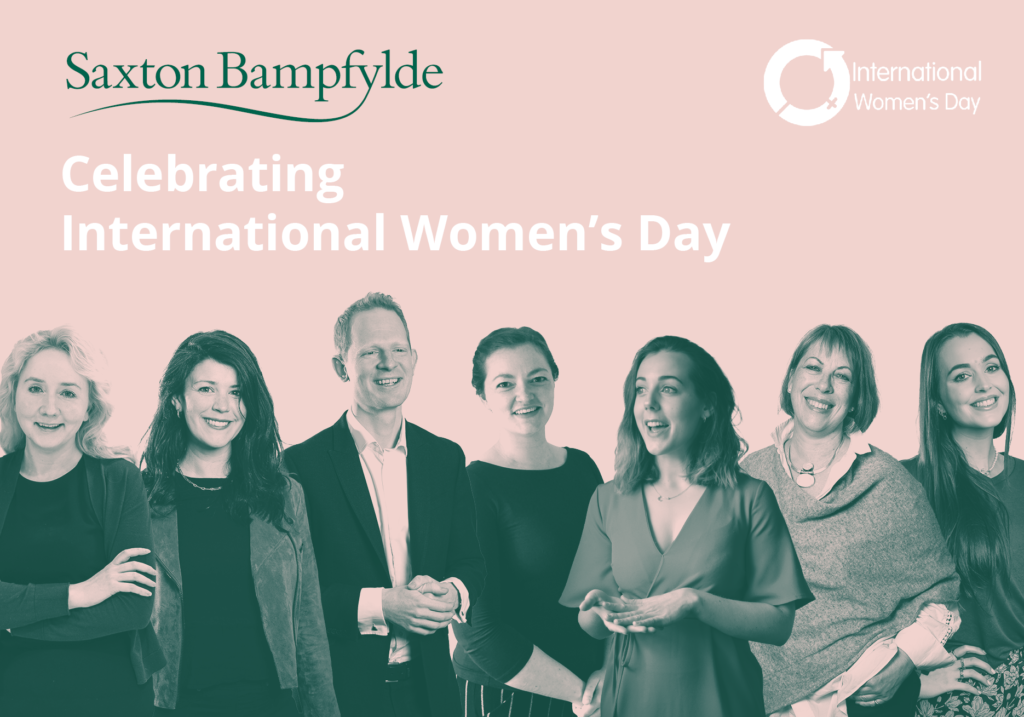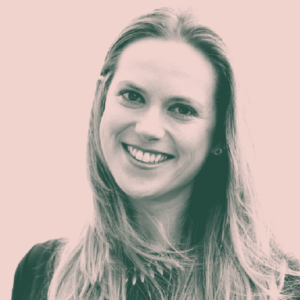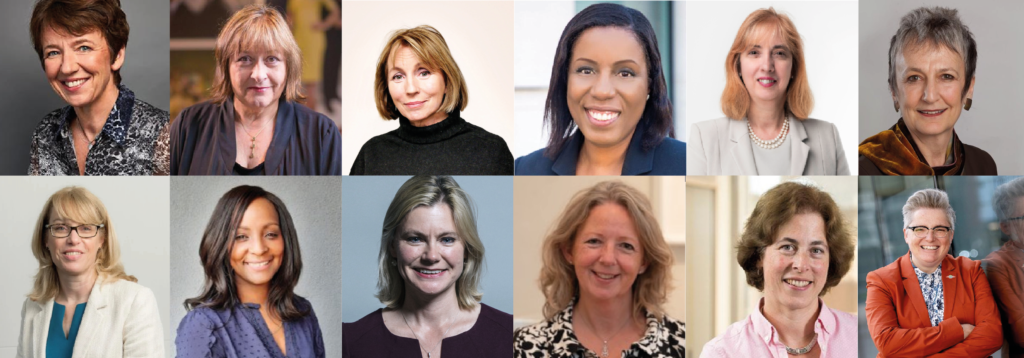
International Women’s Day is an invitation to acknowledge and celebrate the achievements of women globally. It recognises how far we’ve come towards gender equality, and how far we still have to go.
The 2022 IWD theme #BreakTheBias challenges us to take steps and speak out to create a world free from stereotypes and discrimination and make developments towards gender equality in work and in society.
Saxton Bampfylde is proud to be an organisation that lives through its value of responsibility, celebrating talented women, from all backgrounds, for all their work and achievements and supporting them through the challenges they face. As a firm that is made up of 75% extraordinary women, we want to highlight the topic and address the issues of inequality that remain in society. That’s why we’re standing to #BreakTheBias, not just today, but every day!
We’re delighted to share the views from a discussion with our partners on what organisations can do to forge a gender-equal society, and hear about the women who have inspired them most.
What can organisations do to better promote female equality in the workplace?

Kirsten Brooks
Partner, Head of Governance
This is a big question and one that is hugely tied in to societal and cultural norms around gender roles and expectations. And workplaces can play a role in shifting some of these, but equally workplaces need to see some shifts in society as a whole too.
Shared parental leave has the potential to be a real game changer. 6 years on from its introduction, uptake is still as little as around 2% because it is inadequately financed (so not an attractive option to families – or employers), clumsy and complicated. If this was sorted out and made into something more attractive and accessible, it could help significantly to undo some of the deeply ingrained historical and cultural norms surrounding gender roles which hinder equality but also limit the experiences of others (eg fathers losing out on time with their children and same sex couples having to navigate a very narrow system). A proper shared parental leave policy would:
- Equalise absence and opportunity in the workplace; benefiting a wider range of women than just mothers: absences are costly for employers and this has implications for hiring and attrition, perpetuating gender bias. The negative implications are clear for potential mothers but the impacts often span wider to women with no intention of having children but are penalised on the basis of their sex. And of course companies lose out on diverse talent. SPL addresses this by spreading the absence and associated costs of parental leave across both genders.
- Create a greater balance of domestic and caregiving responsibilities which in turn supports mothers who wish to work. I wonder what the percentage of mothers is who decide to leave the workplace because it is all just too much to do both? An SPL policy would bring further balance to the juggle of work and family – not just in terms of working part time or flexible hours to fulfil family responsibilities but also the mental load of it.
- Flexible working is great – with all sorts of benefits for us all, relating to productivity, wellbeing, retention/attraction etc and relevant to this, it has allowed some parents to work who otherwise wouldn’t be able to but short of us all universally adopting a 6 hour working day (a la Sweden), I might argue that it falls short in addressing gender inequality within our current mat/pat leave structure. I fully appreciate there are many men (particularly in Saxton Bampfylde) who are primary caregivers or share family responsibilities very evenly with their partners so I don’t want to appear dismissive or ignorant of that but the data suggests women are more likely to reduce their hours or pull back in their careers to look after their children. If a higher proportion of those who are making use of flexible working arrangements such as part time, or shorter working days are women, can it ever be a truly level playing field?
Policy is a tool that can facilitate cultural change and advancement towards parity and I believe seeing a greater uptake of shared parental leave in workplaces would be a huge game changer for all sorts of different people/groups and both in the workplace and the home!

Jamie Wesley
Partner, Consultant
Where there is a lack of equality, it is invariably the men who have made it so. Sometimes consciously, sometimes unconsciously. So training for all male colleagues on the key issues would be helpful. Men must lead and be seen to lead a more positive example when it comes to gender equality in the workplace, and they have to be allies and collaborators with women in order to address the issues.
I think that men need to start from a position of acceptance that they have (for the most part) been privileged in life in comparison to women. Without seeing this they won’t be able to gain an understanding of why gender equality is something worth being very proactive in fighting for. An example I give to my male friends is to talk about a study of crash test dummies looking at the safety of cars that happened a few years ago. Every dummy had a male, rather than female figure, which research has shown makes driving the vast majority of our cars much less safe for women relative to men. (This is also a great way to demonstrate to men who feel we already have gender equality that we really haven’t). In many cases, gender inequality is hard-wired into the system, and that is what we have to be alive to in order to change things.

Jess Lee
Partner, Researcher
Organisations must have fair and transparent policies around issues that are known to impact women in particular, such as maternity, menopause, progression and promotions, as well as a regular gender pay gap review that reflects seniority within the organisation.

Rebecca Emerick
Partner, Associate Consultant
Organisations should introduce coercive control awareness training, Hestia is doing great work with companies on this issue. It makes companies a genuinely safe place to display vulnerability.
How can women help other women to succeed?

Kirsten Hendry
Partner, Chief of Staff
One of the most helpful things, as a young women entering the workplace or looking to advance in their career is to feel that you have more experienced colleagues or connections who will guide you, advise you and champion you. Being conscious that someone’s background may mean that they don’t arrive with those connections, don’t know how to make them or don’t know that they even need them is really important, and someone offering support can be as important as an organisation having processes and structures that are free from bias.

Sophie Tredinnick
Partner, Consultant
Being honest about difficult experiences, being open and vulnerable with each other and sharing success stories. Explaining what we’ve found to be helpful and how we’ve achieved things and asking others to share their stories in return. Listening to the wonderful women we surround ourselves with and helping them to feel heard is extremely powerful. Reminding women that we can achieve what we want to achieve and it’s a strength to ask for help along the way, not a weakness.
Which woman inspires you most?

Becca Tame
Partner, Researcher
The woman that has inspired me most has always been my mum, as she has an unbelievable ability to put anyone and everyone above herself. Coincidently she also gave me the best piece of advice for my career when I was scared of failing, which was ‘the only way you definitely won’t get it is if you don’t try’, and it was following that advice that led me to get my job!

Rachel Hubbard
Partner, Consultant
My daughter inspires me the most. She is a fabulous mother, wife, sister, friend and daughter – as well as doing an incredibly difficult job. I am in awe of the generosity, love and kindness with which she approached life and how she managed to prioritise what is important – people. I am so proud of her and humbled by who she is and having her in my life. So much more is expected of women than when I was a young mother.

Kirsten Hendry
Honestly I find most inspiration in the women who surround me every day. Young women who have overcome a lot, who are ambitious despite self-doubt, who champion others at every opportunity and who take such pride in following in the footsteps of those that have come before us. There is so much hope to be found in young women and the fierce confidence they show in the face of adversity.

Jess Lee
My grandmother – she moved from Swansea to London to help with the war effort at great personal cost, then moved to Myanmar and Japan with my grandfather in the years following the war to support him and start their family. She was brave and loving, and her sense of daring to go somewhere new or jump into the unknown is a quality I’d love to build in myself!

Jamie Wesley
I can think of so many inspiring women (Idina Menzel, Jacinda Ardern, Claire Balding, Sandi Toksvig, Laura Kuensberg, Marin Alsop (conductor), my wife Holly, my sister!). Honestly though, I think I have to go for my mum. She has raised 5 kids, went to university when she had two of them, had a fab career in global marketing roles at Astra Zeneca and McCann, and for the last 8 years has built a company that is now about 2/3 the size of Saxton Bampfylde. She is also the first women’s equality party counsellor in the country (now there are about three) and has made some significant positive changes in her region (Cheshire) on matters like violence against women and girls, and in general in support of vulnerable people in the community. She is also always there for everyone in her life. I always think about how I can tap into her energy source – it is completely endless!

Rebecca Emerick
Dolly Parton and Jane Fonda. Both women fought misogyny long before it was cool. Dolly’s lyrics have a lot more to them than people think. Klute was such an epic statement on feminism and then making the film 9-5 was really ballsy in its time, standing up for secretaries in the workplace, slimy bosses, the need for flexible child-care.
Saxton Bampfylde proudly championing female leadership
Through our work, Saxton Bampfylde is proud to have been involved in the appointments of many women to senior executive and non-executive roles in international commerce and industry and in the government, higher education and voluntary sectors.
In 2021, we were pleased to report that 48% of our board appointments were female, and that we’ve also placed some of the first female senior executives to organisations that have traditionally been male-led, most recently including:
Lisa Farmer
First woman Chief Executive of RBLI
Amina Shah
First woman Chief Executive and National Librarian of the National Library of Scotland
Professor Abigail Brundin
First woman Director of The British School in Rome
Some of our recent female Board appointments

- Dawn Airey, Tess Alps & Sarah Sands
Non-executive Directors at Channel 4 - Justine Greening
Non-executive Director at On the Beach - Gisela Abbam
Chair of the General Pharmaceutical Council - Dr Carol Homden CBE
Chair of Diabetes UK - Dame Julia Unwin
Chair of Global Open Finance Centre of Excellence at University of Edinburgh - Jenny Watson
Chair of Regulatory Board at ICAEW - Natasha Traynor
Lay Member at University of Manchester - Larissa Joy
Chair at Hawkins Brown - Rima Makarem
Chair at Sue Ryder - Louise Smith
Chair at Innovate Finance